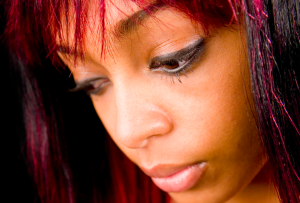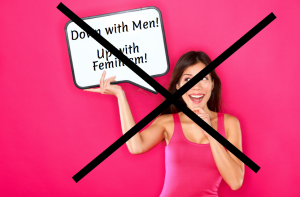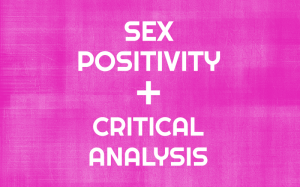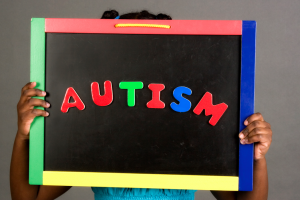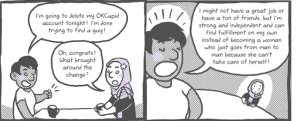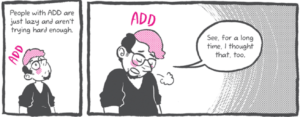I had just turned 21. Most of my friends were older, and I couldn’t wait to get my groove on with them at the club, so I went shopping for a new dress. I picked out a dark blue V-neck minidress and slipped into it in the fitting room.
I liked how I looked. The color complimented my dark brown skin, the shape accentuated my cleavage, and the cut made my legs stretch for days.
But I wasn’t the only judge. I could also hear my grandma, sucking her teeth in disapproval. And the pastor’s wife from the church I’d grown up in, disappointed in what I’d become. And my on-and-off-again boyfriend, who always said he’d never date a “ho.”
I put the dress back and searched for one that wouldn’t show so much skin.
Dang. I wish I could go find that bangin’ dress again. Because now I know what really made me put it back: respectability politics.
“Respectability politics” are rules for marginalized people to follow in order to “earn” respect in mainstream culture.
For Black women, this means policing our appearance, speech, and sexuality with pressure to be an upstanding Black woman – not the kind who makes the rest of us “look bad.” We adjust our own behavior to avoid the racist, classist, and sexist stereotypes other people might put us into.
Sadly, we often put this pressure on each other and ourselves. Sure, the ultimate culprit is racism – the system of white supremacy in the United States devalues us just because we’re Black.
But as a natural result of living with such an oppressive system, we can internalize racism and hold ourselves to oppressive standards in order to get by.
These are the standards that made me think wearing a dress that showed skin would make me a “ho,” instead of understanding that I should be able to wear whatever I want without assumptions of promiscuity – and that there’s nothing wrong with being a sex worker anyway.
And these are the standards that have some people scrutinizing how Sandra Bland behaved when she was rightfully angry at Texas state trooper Brian Encinia for threatening and physically attacking her for no reason.
Sandy, as her sister called her, died three days later in a jail cell. We should be demanding justice and accountability, because whether Sandy Bland committed suicide or not, the state is responsible for her death.
But for some people, Bland is the one on trial. They think she shouldn’t have been so angry, shouldn’t have talked back, shouldn’t have acted “uppity” with the officer who violated her rights.
To blame her, we have to look away from the truth: The institutional racism that allows police to target, arrest, assault, and kill people of color without consequences every day, regardless of how “angry” the victims are.
And the more time we spend blaming her for becoming yet another victim of this system, the less time we spend fighting for justice. This is an example of the one of the most dire consequences of racist self-hatred.
Respectability politics kill.
The motivation of respectability makes sense – we want to survive. We want to protect ourselves and each other and to maintain our dignity, instead of being treated like we’re inferior. So it’s not easy to let go of these rules, and we can’t just pretend they don’t affect our lives.
But the way we’re often taught to seek protection doesn’t actually take care of us. Lessons in respectability politics teach us to hate our true selves and try to be something we’re not.
These are some of the lessons I’ve learned – and what unlearning them has done for my self-love and liberation.
1. Don’t Be Angry
We’ve all encountered her in the media: The Angry Black Woman.
She’s rolling her neck and snapping her fingers, speaking loudly and giving the audience a laugh. She’s usually a caricature, but she shows up in real life, too – whenever a Black woman raises her voice or defends herself, she’s reduced to this stereotype and ridiculed, criminalized, or said to be “overreacting.”
I never wanted to be this woman. For as long as I can remember, I’ve done my best to avoid showing anger. I put my energy into trying to be “nice” instead – which meant keeping a smile on my face even if someone had done me wrong.
But the thing is, being “nice” hasn’t saved me from microaggressions and other mistreatments against women stereotyped as the Angry Black Woman.
I once was at a bar with a date, a white man, when another white man approached him to offer some advice.
“I’m married to a Black woman,” the stranger slurred.
I looked at him, patiently awaiting his arrival to his point with my eyebrow slightly raised. And I guess that was enough to prove his assumptions about me. He pointed at my face, said “Exactly!” and launched into a tirade about his wife’s temper.
Maybe what he said about his wife was true. For all I know, the woman could be in serious need of anger management counseling.
But he didn’t consider that his wife and I are unique individuals. He cast us both as the Angry Black Woman just because we both happen to be Black.
Respectability politics would’ve called for me to try to change how he saw us. To smile and laugh, maybe even jump in to help deride his wife and prove that “not all of us are like that.” I didn’t have an angry outburst. But I did turn my back on the guy until he got the hint and went away.
That was one of many moments that helped me realize that my efforts to avoid the Angry Black Woman stereotype were very misguided.
Kindness is great – I’m a big fan. But demonizing Black women who show anger isn’t about encouraging us to be be kind or level-headed.
It’s a racist and sexist attempt to dismiss us even when our anger is justified.
It’s the idea that even Sandra Bland, who had a right to be angry and absolutely did not deserve to die, brought her fate on herself because she dared to express how she felt.
Kesiena Boom asked a great question that puts this in perspective: “Why is Black women’s anger seen as unacceptable but the conditions that create it are left to fester?”
We have a right to be angry – every day, we face racism, sexism, and violence that take a toll on our mental and physical wellbeing. And if you’re anything like me, your anger doesn’t disappear when you avoid expressing it.
You probably internalize it, and it turns into shame, anxiety, or fear. When you can’t even stand up for yourself without being villainized, you’re forced to suffer silently, and told to be “grateful” for how you’re treated, even when you’re treated badly.
But you deserve so much better. And not just when you’re “nice enough” to earn respect.
Like every other human being, Black women deserve to be treated with dignity. Which is exactly why your anger shows up – to stand up for your dignity.
Getting angry doesn’t mean you’re any less deserving of respect, and it sure doesn’t mean you deserve violence. Your anger is a gift.
2. In Fact, Don’t Show Your Emotions At All
A respectable Black woman is a Strong Black Woman, who can get through anything without getting emotional – right?
Wrong – so many things wrong. But this is what respectability politics had me believing. I saw the Strong Black Woman as the person I should aspire to be – someone who could withstand all hardships without support.
But there have been times when I’ve been very much in need of support.
You could say I was strong when I was in a relationship with an abusive partner. I was holding down a job, getting good grades in college, and putting on a happy face so nobody knew what was wrong.
But the image I was projecting to the world wasn’t true to what I was feeling. Inside, I was a wreck of fear, sadness, and hopelessness.
And even though all of those emotions made perfect sense – considering that I was dealing with emotional, physical, and sexual violence every single day – I was ashamed of every one of them.
Invincibility is an impossible standard to live up to. But respectability politics say that we should be independent, self-sufficient, and taking care of others rather than tending to our own needs.
This pressure only adds to the burdens we carry, as we’re already dealing with high rates of violence, poverty, and discrimination.
And we’re supposed to handle all of that without admitting we’re hurting? Forget that. In the years since I left that abusive ex-partner, I’ve learned that it actually takes a lot of strength to ask for support. Vulnerability is a terrifying, but beautiful, thing.
Let’s be clear: It is in no way respectful to dehumanize Black women by characterizing us as superhuman beings who can be treated badly because “we can take it.”
Respecting us means recognizing our humanity – and with humanity comes emotion.
So if you need to cry, go to therapy, or ask for help, you have nothing to be ashamed of. Your emotions are there to take care of you, and you get to ask for what you need to take care of yourself, too.
3. Get a College Degree
Unlearning this lesson earlier could’ve saved me a lot on student loan debt – but I’m glad I managed to unlearn it eventually.
Many of us learn that education is the key to overcoming the obstacles that get in our way. We’re told that we can get out of poverty, rise above stereotypes, and give our families and communities hope if we stay in school, get good grades, and go to college.
And the respectability of being an Educated Black Woman is about even more than school.
It’s also about racist and classist ideas that we’re more valuable if we live up to the standards of white supremacy.
That means talking “proper” – as opposed to speaking in the African American Vernacular English (AAVE) that many of us are comfortable with. It means dressing in fancy clothes to avoid being stereotyped as “ghetto.”
It means believing those memes that compare educated Black women to so-called “hood rats” who twerk, and blaming the latter for discrimination against the Black community.
I once believed all that and more. I thought I had to get the best possible education – which essentially meant learning to fit in with my white peers – in hopes of accessing the opportunities their white privilege gives them.
I had good grades and a choice of several schools, and I chose one of the most prestigious, even though it was terribly expensive – even with a scholarship that paid half my tuition. I thought I had to do whatever it would take to get a respectable education.
But going to a private university didn’t make me feel more respected. I didn’t fit in, and I dealt with racist microaggressions every day. For many reasons, I was miserable at that school, and during my second year, I transferred to a state school where I was much happier.
Since then, I’ve learned enough about how white supremacy works to know that I can’t protect myself from racism with college degrees or by speaking or dressing like my white peers.
Just ask the Black students and professors who get racially profiled on their own campuses, or the Black scholars subject to tone-policing just like the rest of us. In many ways, academia isn’t designed to support us, so we just encounter more forms of racism when we try to escape it this way.
It can leave you feeling pretty hopeless. Because you can work just as hard – no, twice as hard – as your white peers, and still get shut out of success by racism and targeted for violence.
But for me, the best thing about unlearning this lesson is learning that academia isn’t our only source of power.
We have knowledge and strength in our own culture and traditions – including the very language and behavior that others call “ghetto.” With our creativity and intuition, we’ve created things like music, hairstyles, and traditions that help us share our wisdom, express our joy, and resist oppression.
We’ve birthed influential social justice movements, built resources to help each other survive, and crafted innovative ways to keep our communities safe.
An education can be valuable, but it’s sure not the only way for a Black woman to be successful or respectable. And you shouldn’t have to fit the image of the Educated Black Woman in order to be safe.
4. Don’t Be a Sexual Being
This message sure did a doozy on me. I learned at an early age that girls who enjoyed sex were “fast,” and fast girls were bad people.
In the media, Black women are hypersexualized, shown as having animalistic desires – and I thought being a Black woman who enjoyed sex meant fitting that degrading image. Which sure made things inconvenient when my strong desire to have sex kicked in. For many people, this desire comes naturally, so there’s nothing wrong with being sexually active.
But when respectability comes into play, Black women face pressure to make sure we don’t act on our desires.
For us, the virgin/whore dichotomy that affects all women shows up as the Jezebel versus the Good Church Girl, or the Happily Married Woman, or the Good Mother. In other words, we either have to prove that we have self-control over our desires, or be judged as immoral and promiscuous.
Which doesn’t leave room for many of the natural elements of having a healthy sex life, including exploring to learn what you like, or even enjoying the act of sex for the sake of our own pleasure.
As I became a young woman and realized I enjoyed sex, this expectation made me doubt myself even outside of the bedroom. There was the idea that I was a “ho” if I dressed in tight clothing – which made me feel ashamed even in the most “professional” clothing that clung to my curves.
There was the heteronormative expectation that I’d eventually marry a man – which made me want to hide my queer bisexual identity. There was the message that my sexual assault was my fault – because of the victim-blaming message that a woman who pursues her sexual desires is responsible for her own rape.
I’m learning to trust that there’s nothing wrong with my body, my identity, or my desires. But it takes a long process of healing to recover from a lifetime of sex-shaming messages.
It doesn’t help that we still have things like “thot vs. African queen” memes and criticism of Black female entertainers who openly express their sexuality, like Nicki Minaj.
Just as much as anyone else, Black women deserve to own our sexual desires and make our own choices about how we express them.
As long as everyone involved is safe and consenting, there’s nothing wrong with being a sexual being.
You deserve pleasure. I know it goes against what you’ve been taught – the rules of respectability politics have us thinking of others before ourselves. Which makes pleasure seem like an unnecessary – and even unethical – indulgence. You can internalize the dehumanizing message that you’re less valuable if you enjoy sex.
But having something that’s just for you doesn’t make you a bad person. It helps make you a whole person. If sexual desire is part of who you are, then sexual pleasure can help honor your wholeness.
5. Look ‘Put Together’
Caring about your appearance doesn’t seem like an oppressive expectation, right? Looking put together helps us make a positive first impression, showing everyone from potential employers to potential dates that we’re worth their time.
The problem of respectability appears when looking “put together” is code for not looking like yourself.
For instance, what would you have to change about yourself to look “professional?” To get and keep jobs, you usually have to look your best.
But what’s often unsaid is that common standards of professionalism favor white folks, especially men.
For me, the typical image of “professionalism” feels more like a costume than a representation of my best self. My hair is one big example. To have any chance of succeeding in the corporate world, I’d have to get a relaxer or go through an hours-long process of flat ironing my hair each morning.
Wearing the traditionally Black styles that make me and my hair happiest – like twists, dreadlocks, and afros – puts me at a disadvantage, because many people don’t think those styles look professional.
And it’s not just white folks. Lots of people don’t think twice about the widespread rules that say our hair is inherently unappealing.
In fact, some Black folks are among the most enthusiastic supporters of these rules. In spite of the fact that the rules have no basis in reality – the way you wear your hair has nothing to do with whether or not you can do your job.
The pressure to change your appearance in order to be valued in spaces like the workplace can take a detrimental toll on you.
We have to put in more time, money, and effort than many of our white peers in order to be taken seriously. On top of that, we can lose our sense of self and our confidence in ourselves by internalizing the belief that the way we look naturally is unappealing.
Most of the women in my family can’t imagine why I take the risk of wearing my 4C hair naturally. And it’s not just the limits on my job prospects that worry them. They believe that my natural hair – the same hair type that grows naturally from their heads – is ugly in comparison to straightened hair.
They make comments about the “nastiness” of dreadlocks. They’ll offer a hairstylist’s business card to any woman with an afro, encouraging her to call and “get her hair done.”
They don’t actually say it’s because I should make my hair look like a white woman’s hair. But with professional standards, media images and more sending the message that white women with straight hair are far more beautiful than Black women with kinky hair, it’s not hard to see where their ideas come from.
The hardest part is that these women I love must hate some part of themselves, to feel so strongly that Black hair isn’t beautiful. They haven’t seen their natural hair in decades, and any sign of it sprouting from their scalp is quickly concealed.
It’s okay if you prefer to straighten your hair. Part of the beauty of Black hair is that we have many versatile options, and I know you’re not necessarily drinking the Eurocentric beauty kool-aid if you choose a relaxer over going natural.
As long as you know that you shouldn’t have to strive to meet standards of appearance based on whiteness to deserve respect.
Sometimes my appearance is pretty close to what society would expect of me – I’m a woman who embraces stereotypically feminine styles like dresses and colorful makeup. But unlearning lessons of respectability means figuring out what I like about my appearance – not what my family or anyone else thinks I should change about myself.
For me, that includes looking in the mirror and recognizing the beauty of my natural hair.
What does styling yourself just for you mean?
***
These days, I don’t go out to clubs very often, but not because I’m ashamed to be a “club girl.” Mostly because I’m in bed long before the parties start.
But I love to dance. And I have my moments when I like wearing clothes that show off my curves. And my moments when I get angry. And my moments when I don’t use “classy language.” And my moments when I think of my own needs before anyone else’s.
It may not seem like a big deal, but when I embrace my true authentic self in these moments, I add more strength to the armor that protects me from white supremacy.
Resisting respectability politics means recognizing where oppression really comes from: racist hatred of our Blackness, not just of how “badly” we behave. We can’t win if we’re trying to meet impossible and oppressive standards.
It’ll take some work, but I believe you can shed the pressure of those standards and set your authentic self free. Surround yourself with people and messages that nurture your freedom.
Maybe I’ll see you in the club, and we can dance it out to celebrate our whole selves.
[do_widget id=’text-101′]
Maisha Z. Johnson is the Digital Content Associate and Staff Writer of Everyday Feminism. You can find her writing at the intersections and shamelessly indulging in her obsession with pop culture around the web. Maisha’s past work includes Community United Against Violence (CUAV), the nation’s oldest LGBTQ anti-violence organization, and Fired Up!, a program of California Coalition for Women Prisoners. Through her own project, Inkblot Arts, Maisha taps into the creative arts and digital media to amplify the voices of those often silenced. Like her on Facebook or follow her on Twitter @mzjwords.
Search our 3000+ articles!
Read our articles about:
Our online racial justice training
Used by hundreds of universities, non-profits, and businesses.
Click to learn more


